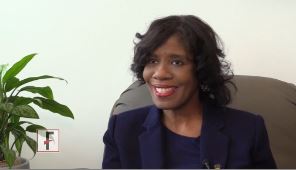User login
WASHINGTON – As the prescription opioid crisis rages, how physicians evaluate, define, and treat chronic pain is evolving.
“In the science books, there’s a definition of pain,” explained Dr. Patrice Harris, psychiatrist and chair of the American Medical Association’s Task Force to Reduce Prescription Opioid Abuse. But how individuals actually perceive pain in different situations is very complex. No matter what kind of measuring tool physicians apply, she noted, “pain is going to be personal.”
In a candid interview, Dr. Harris discussed the limitation of pain scales, the value of conversations between physicians and their patients, and the importance of cultural competency to alleviate suffering and avoid unintentional harm.
The video associated with this article is no longer available on this site. Please view all of our videos on the MDedge YouTube channel
On Twitter @whitneymcknight
WASHINGTON – As the prescription opioid crisis rages, how physicians evaluate, define, and treat chronic pain is evolving.
“In the science books, there’s a definition of pain,” explained Dr. Patrice Harris, psychiatrist and chair of the American Medical Association’s Task Force to Reduce Prescription Opioid Abuse. But how individuals actually perceive pain in different situations is very complex. No matter what kind of measuring tool physicians apply, she noted, “pain is going to be personal.”
In a candid interview, Dr. Harris discussed the limitation of pain scales, the value of conversations between physicians and their patients, and the importance of cultural competency to alleviate suffering and avoid unintentional harm.
The video associated with this article is no longer available on this site. Please view all of our videos on the MDedge YouTube channel
On Twitter @whitneymcknight
WASHINGTON – As the prescription opioid crisis rages, how physicians evaluate, define, and treat chronic pain is evolving.
“In the science books, there’s a definition of pain,” explained Dr. Patrice Harris, psychiatrist and chair of the American Medical Association’s Task Force to Reduce Prescription Opioid Abuse. But how individuals actually perceive pain in different situations is very complex. No matter what kind of measuring tool physicians apply, she noted, “pain is going to be personal.”
In a candid interview, Dr. Harris discussed the limitation of pain scales, the value of conversations between physicians and their patients, and the importance of cultural competency to alleviate suffering and avoid unintentional harm.
The video associated with this article is no longer available on this site. Please view all of our videos on the MDedge YouTube channel
On Twitter @whitneymcknight
